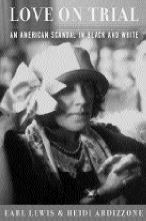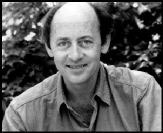In 1952 the reading world was dazzled by Invisible Man, the story of an anonymous black youth growing up in the aggressively racist milieu of early-20th-century America. A 1965 survey of 200 prominent literary figures pronounced Invisible Man the greatest American novel since World War II. In the near half-century since the appearance of Ellison’s first novel, readers have hungered for his second. He began writing it in 1951 and died in 1994 before completing it. In the meantime he’d written dozens of essays whose extraordinary brilliance made many, in the words of novelist David Bradley, “wonder if we have not been waiting for the wrong thing.” Yet neither of Ellison’s essay collections (Shadow and Act and Going to the Territory) aroused excitement like the news that a book-length section of his unfinished manuscript would be published this summer as Juneteenth. An eager public is already asking whether the book will measure up to Invisible Man. It’s the wrong question.
Juneteenth by Ralph Ellison (Random House, $25)
The new book comes from a wilder narrative country. If Invisible Man can be called an American Portrait of the Artist, then Juneteenth is Ulysses. It is far more layered and more subtly allusive than its predecessor, depends more heavily on stream-of-consciousness style, and makes greater demands on any reader who would seek to grasp it whole. Nor are the settings of Juneteenth sharply rendered social and physical scenes like the segregated South and the ’30s Harlem negotiated by Invisible Man. The landscapes are almost entirely psychological and dialogical, and much easier to get lost in.
Finally, the new novel is no bildungsroman chronologically arranged to mirror a child’s gradual maturation into a self. Juneteenth is an unbildungsroman if you will, whose formal derangements reflect a grown man’s narrowly crafted, carefully managed false self coming undone.
Bliss, a child born of a white mother who disappears and a father who is never identified, is raised by a black jazz musician, Hickman, later a revivalist minister. The youth leaves his foster father and his name behind to become an itinerant filmmaker and con artist sometimes called Movie Man. Whether he is actually white or passes for white is left ambiguous, but he looks white. Eventually, having reinvented himself one last time, he gains a seat in the US Congress as Senator Sunraider.
The narrative begins in the early ’50s, when the famously bigoted Sunraider is shot while addressing the Senate, and Hickman arrives at the hospital to maintain a vigil by his side. In conversations interspersed with interior monologues, the two men recall events that bound and divided them. And we realize that Sunraider’s old name, the one Hickman gave the baby he midwifed into the world, still applies: “I’ll call him Bliss,” Hickman had mused long ago, “because they say that’s what ignorance is.”
As the wounded Sunraider alternately sinks into delirium and resurfaces, his memories swing from childhood to adulthood and back again. He remembers his early playmates, his fling as a young man with a beautiful black Oklahoma woman (The New Yorker recently published an abridgement of this part as a love story), and a Juneteenth festival during a time when he, as the 6-year-old Reverend Bliss, co-leads religious revivals with Daddy Hickman.
One of the best sermons the pair delivers in brilliant call-and-response style is their commemoration of Juneteenth, or June 19, 1865, when a Yankee troop informed Texas slaves of their freedom, two years after the Emancipation Proclamation. Bliss grows up in ignorance, too, but his is willed. He refuses to learn that he is most free when held in the strong embrace of his black community.
The reader, on the other hand, knows this. Sister Georgia rescues little Bliss from a fracas a white woman causes in the Juneteenth tent, and outside Sister Georgia’s remote house in the woods, as she and the boy chatter about ordinary things, the world grows subtly magical. They watch the reflections of stars on the water in a well, their voices drifting down into the quiet pool. Bliss quotes verses from the Book of Job. He and Sister Georgia pull up a melon chilled among the watery stars. They share deliciously cool red slices. Bliss learns not to spit seeds into the yard. He pees bravely into the darkness. He is tucked into bed, for the first time feeling that he’s met his mother; yet he’s teased by a more mysterious longing, too. It’s night, the boy wants the mother he’s never known, he’s aware of Sister Georgia in more than just a little-boy way—I’ve read nothing so exquisite anywhere, ever; nothing as earthy, funny, subtle, sweet, and real. Yet the episode is complex, and not merely Eden seen through a golden haze of nostalgia; Bliss’ time at Sister Georgia’s house ends in his tragic expulsion from the garden.
One challenge to a reader of Juneteenth is staying with Bliss’ point of view when he gets older. Sunraider’s orotund pomposity, alternating with mordant sarcasm, tries our patience—but the voice is a mirror of the soul. He has denied so much of himself that he’s thin as paper, and trying hard to thicken his flimsy self by writing upon it with false eloquence and wit. A reader without this awareness may be disappointed by the picnic excerpt published in The New Yorker. As a separate love story it sounds stereotyped and sentimental, with its dappled shade and apple-blossom fragrance and peach-brown feminine coyness and perfect fried chicken. But the same narrative becomes ironic and more interesting if we see its overblown clich鳠as expressions of Bliss-become-Movie-Man’s moral and spiritual hollowness. The unspoiled Bliss voice we hear during those first hours at Sister Georgia’s house is that of a child who has never seen a movie, whose imagination has not yet been co-opted by the roseate soft focus of cinematic romance imagery.
While Bliss comes unglued, Hickman holds firm at the center. His utterly original voice—eloquent, richly colloquial, full of generosity, humor, and keen observation—opens and closes the narrative. It’s the voice of a man with extraordinary integrity who makes mistakes because he can’t always see far enough. But he’s wiser than we. When he tells Sunraider how white children raised by black nannies learn to reject their foster mothers and stifle any love or dependence they might feel in order to enter American society as adults, he is helping to explain Bliss’ incompleteness. If our first love—like Bliss’ love for his black Daddy Hickman—must be evaded and denied, we can never achieve the wholeness that might be ours if we could sustain our original attachment.
And in talking about the forcible rejection of the black “mother” (male or female) by young whites, Ellison is signifying further. Americans are born from and fostered in a culture that’s partly black, yet many of us are taught to deny our roots in it. In doing so, we (like Bliss) fail to complete ourselves; we cannot develop a solid integrity; we work at cross purposes with other people and within our own hearts; we may even destroy ourselves. Ellison’s ambiguity about whether Bliss is white or black is deliberate. Culturally, all Americans are both black and white, regardless of skin color, and Juneteenth dramatizes the psychological truth behind the toast Ellison raises in a 1954 letter to a friend: “Here’s to integration, the only integration that counts: that of the personality.”
The book isn’t always such a pleasure. When young Hickman nurses the pregnant white woman through labor and delivery, after she has told the lie that caused his brother to be lynched and his sick mother to die of shock and grief, his overwrought rhetoric is sometimes more melodramatic than convincingly anguished. Parts of the Senator’s more delirious reveries are mystifying. And anyone familiar with Ellison’s dream narratives knows that once this author starts telling a dream, whether in a fanciful tale or a factual essay, the reader will feel a bit like the wedding guest the Ancient Mariner won’t let go.
But the book is magnificently written overall and a compelling experience for the ethical imagination, especially if we don’t ask it to be something it’s not. Juneteenth may read like a novel, may fit one definition of a novel (“a book-long narrative”), and compare in some respects with novels we know. But it’s one section of an unfinished work that might eventually have been divided into several volumes—like The Brothers Karamozov, if Dostoevsky had stayed with what some say was a plan to write the novel in book-length parts, one devoted to each of the brothers. How differently we would see Alyosha if, as the protagonist of his own story, he were rounded into full personhood instead of being just an angelic foil to his brothers! But we don’t call Alyosha unfinished or the narrative truncated. Juneteenth, on the other hand, will feel to some readers as if it might have gaps and loose ends—the kind we might expect, of course, in a narrative lifted from a larger work, especially one that’s an ambitious, Moby Dickscale saga expressly designed to frustrate the capacity of any mind to contain it whole.
So there will be quarrels. Some of Ellison’s devotees will argue that the book is an overly unified segment, fatally misrepresenting the complexity of Ellison’s opus. Others will say that even if the published part were carefully left amorphous, releasing any part of the manuscript as a separate work flouts the author’s intentions. To me, the book has a powerful unity and coherence, read as a psychological narrative. Maybe this reading too easily explains serious lapses and lacunae as devices for mirroring psychic disintegration. But even aspects that Ellison crafted to perfection may fall short if we judge them according to criteria that are, without our knowing it, irrelevant. The nature of the book makes it difficult if not impossible to measure the extent of the author’s control over his materials.
So we can just let ourselves love Juneteenth. And we can be grateful to John Callahan and Mrs. Ralph Ellison for not archiving the manuscript away or restricting access to scholars a century from now. Sister Bearmasher and her indignant refrain of “Just dig-a my grave!“; Mrs. Proctor’s joke on the woman she works for, who can’t understand how Mrs. Proctor gets the laundry so beautifully white; the Reverend Eatmore’s sermon, “Give a man wood and he will learn to make fire,” which becomes a hilarious fable about the Promised Land of America; Hickman’s shaggy-dog story of the rich white lady who adopts and then loses children of various races as casually as she nibbles eclairs; the hard-won, magnificent, humbling ethic at the center of Hickman’s being—how could I have lived without meeting these people and hearing their unforgettable voices? What’s good in Juneteenth (and that’s nearly all of it) is glorious.
The calculus of ‘Juneteenth’ How Ellison’s executor brought the novel together >>
Judy Lightfoot is a poet, teacher of African-American and English literature at Lakeside School, and coordinator of a marathon public readaround of ‘Juneteenth’ to be held all day Saturday, June 19, at the Langston Hughes Theater.







